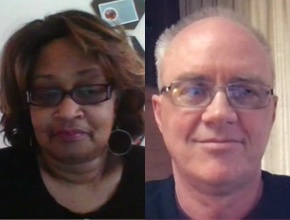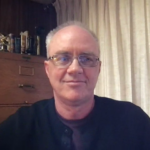Description
Friends and colleagues Rev. Marian Hatcher (59) and Dr. Michael Shively (59) talk about their work in the anti-trafficking field, the need of dealing with buyers, and the importance of having survivors on the front lines.Subject Log / Time Code
Michael (M) talks about what he envisioned for his life as a kid. He shares he was from a small town of 500 people. He says there were some formative experiences that helped him get to what he is doing now and has been doing for thirty years.
M says that during his later teen years he learned that his peers of young women were experiencing date rape, despite them not having that language in the 1970s in a small town. M recalls working at a restaurant and one day learning that the previous night one of his co-workers, a young woman, had stopped at the side of the road to help a man who ended up raping her and taking her clothes and car. M learned that the young woman tried to find his driveway because she felt that he would help her. M says when he was going through college he gravitated towards subjects of domestic violence, intimate partner violence, marital rape, etc. He says he chose to focus on the role of men as perpetrators of violence.
M talks about continuing his interests in academia and later leaving academia to work at a research lab. M says his research found that over 25% of districts identified some from of trafficking in their communities. M talks about questioning what was happening to deter people from buying sex and what people were doing about the demand side of commercial sex.
M talks about the SAGE project (Standing Against Global Exploitation) in San Francisco, a survivor-led support program. M explains that SAGE emphasized the need for dealing with and deterring buyers. M explains SAGE led the formation of a class to educate men arrested for buying commercial sex, the John School Program (or buyer education program).
M talks about meeting Marian (MH) in Chicago. He explains that in Chicago, the Women of Power Alumni Association, which Mariana was the vice president of at the time, was doing great work putting survivors on the front line and getting everyone to understand that buyers needed to be dealt with.
MH talks more about Women of Power Alumni Association how successful and effective their model of survivors working with law enforcement was. M highlights the significance of the Cook County Sheriff’s Office hiring MH, not just putting her on a task force, but hiring her and paying her.
MH talks about the agency and authority she was given within the Sheriff’s office to do her work. She talks about the resources she was able to gain from the sheriff’s partnership with M.
M talks about the importance and role of emerging technology to help combat human trafficking. M and MH discuss Child Safe AI, a technology that MH helped to develop.
M discusses the importance of leveraging what capacities and tools already exist when combating human trafficking. He talks about how collaboration can also unlock a load of new resources and opportunities.
M talks about how the classification of crimes affects how easily funding and attention is garnered.
M talks about the natural uptick in commercial sex around the time of big events such as the super bowl and how the NJSI, the National John Suppression Initiative, fought to combat that.
MH shares that she helped execute the first 18 stings under the the NJSI and how the stings have been able to continue now that she is on medical leave.
M talks about his work under the National Center on Sexual Exploitation in Washington DC. M says his goal is to collect information and put it in the hands of people that can do something with it. M says there is a need for better information in the anti-trafficking field.
M emphasizes again the importance of dealing with consumer demand for commercial sex. He explains it is the root cause and the main motive for anyone to traffick someone else. M says he is trying to fight back against the argument for fully decriminalizing sex work. M and MH discuss how every pimp, trafficker, and buyer wants decriminalization because it would allow them to thrive. M and MH discuss the difference between decriminalizing sex work versus legalizing and regulating it.
Participants
- Marian Hatcher
- Michael Shively



